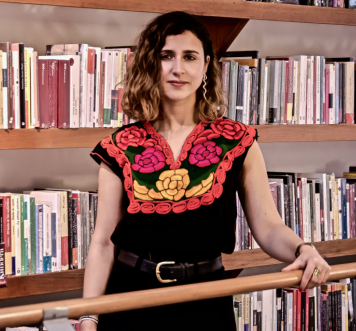Collectivity, Territory, and Justice in the participation of the Madres de Soacha in the Theatrical Collective Creation Antigona, tribunal de mujeres
May 27, 2025

During the summer of 2024, I had the opportunity to expand the first chapter of my dissertation, titled, Individualmente no vamos a conseguir nada: Colectividad, Territorio y Justicia en la Participación de las Madres de Soacha en la Creación Colectiva de “Antígonas, tribunal de Mujeres” (Collectivity, Territory, and Justice in the Participation of the Madres de Soacha in the Theatrical Collective Creation of ‘Antigones, Women’s Tribunal’). With the support of the GC Public Scholarship Practice Space Fellowship, I spent July and August as a resident researcher at the Corporación Colombiana de Teatro in Bogotá, Colombia.
My research focused on three extraordinary women—Lucero Carmona, María Ubilerma Sanabria López, and Luz Marina Bernal—and their participation in the play Antígonas, tribunal de mujeres. These women are part of a larger group of mothers whose children were victims of the case euphemistically called Falsos Positivos, in which innocent young men from vulnerable communities were executed by the Colombian military and falsely presented as guerrillas killed in combat. This atrocity, which occurred during the presidency of Álvaro Uribe (2002–2010), was addressed through the play, led by Tramaluna Teatro, as part of the Corporación Colombiana de Teatro.
Using a feminist theoretical framework, my research examined how the collaboration of these women in creating the play challenges traditional gendered expectations of justice—specifically, the assumption that mothers are inherently tied to the pursuit of justice for state crimes. Additionally, through a Marxist-oriented critical geography lens, I explored the significance of the term “Madres de Soacha” and its territorial implications within the context of Soacha. Historically sacred to the Muisca people, this region is now deeply scarred by state violence and resource exploitation, making it a contested space.
The fellowship allowed me to conduct in-depth interviews with Carmona, Sanabria, and Bernal, as well as with the entire Tramaluna Teatro crew. I also carried out archival research at the Centro Nacional de Memoria Histórica and visited Soacha, where I had the opportunity to meet Luz Marina Bernal and Lucero Carmona in person. This encounter deepened my understanding of the emotional and political weight of their performance repertoire, which they use to demand justice for their sons and preserve their memories.
The work of these women transcends personal grief, offering a radical rethinking of justice and responsibility that extends beyond traditional familial bonds. It invites us to reflect on our connections and obligations to others in the face of state violence.
Additionally, the grant supported the production of a short documentary, which offers a glimpse into this transformative research and the methodologies of community theater. The documentary is still in its rough-cut phase, as further interviews and archival materials are yet to be incorporated. I hope to secure additional resources to complete it in the future.


Antígonas Tribunal de Mujeres Cast. Archival photograph, courtesy of Corporación Colombiana del Teatro.Angela Triana Gallego; Lina Támara; Karen roa; Luz MarinaBernal Parra; María Ubilerma Sanabria López; Lucero Carmona; Orceni MontañezMuñoz; Fanny Palacios Romero; Mayra López Severiche; Dora Lucy Arias.
Author

Fátima Vélez
PS2 Public Research Fellow
Fátima Vélez is a writer, professor, cultural producer, and Ph.D. candidate in Hispano-American Literature and Cultures at the Graduate Center, CUNY. Fátima’s main interests include contemporary Latin American Literature and Culture, focusing on decolonial feminism, ecofeminism, queer/cuir theories, critical geography, and Civil Rights movements and activism.
